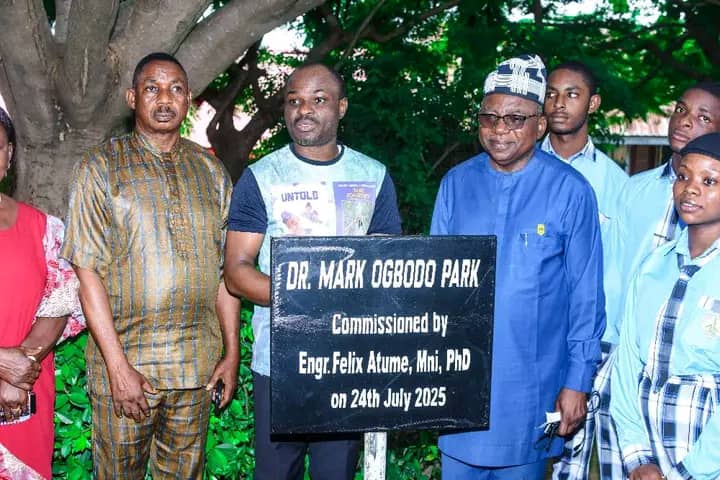NEWS
Shettima Arrives New York for 79th UNGA

Vice-President Kashim Shettima has arrived in New York to represent Nigeria at the 79th United Nations General Assembly (UNGA).Mr Stanley Nkwocha, Senior Special Assistant to the President on Media & Communications (Office of The Vice President), made this known in a statement on Monday.
According to Nkwocha, Shettima touched down at John F. Kennedy International Airport, New York in the early hours of Monday. He said on arrival, the vice-president was received by the Minister of Foreign Affairs, Amb. Yusuf Tuggar; and Minister of Communications, Innovation & Digital Economy, Dr Bosun Tijani.Others were the Director-General of the National Information Technology Development Agency (NITDA), Kashifu Inuwa; Nigerian diplomats, UN officials and many others.Nkwocha said as directed by President Bola Tinubu, Shettima would lead Nigeria’s delegation to this year’s UNGA.He added that the vice-president would deliver Nigeria’s national statement and participate in various high-level meetings.The 79th session of UNGA marks a crucial milestone in the global effort to accelerate progress towards the 17 Sustainable Development Goals (SDGs).The highly anticipated Summit of the Future, held during UNGA, underscores the urgent need for enhanced international cooperation.It us to address pressing challenges such as climate change, poverty and inequality, while also tackling the impacts of ongoing conflicts and global health crises.The UN Department of Global Communications will hold its flagship SDG Media Zone during the high-level week 23-27 September, with impactful in-depth interviews and dialogues on global issues that matter to people everywhere.The Heads of State and Government will gather at UN Headquarters in New York on 22-23 Sept. to address the critical challenges and gaps in global governance exposed by recent global shocks.The summit aims to reaffirm commitments to the Sustainable Development Goals (SDGs) and the UN Charter while enhancing cooperation and laying the foundations for a reinvigorated multilateral system.The summit will result in a negotiated Pact for the Future, an action-oriented document aimed to bolster global cooperation and adapt to current challenges effectively for the benefit of all and for future generations.In addition, the Secretary-General of the United Nations is convening the Summit of the Future Action Days on 20 and 21 September to generate additional opportunities for the engagement of all the actors. (NAN)NEWS
Group Backs Students With Disabilities, Distributes Learning Materials in Nasarawa

From Abel Zwanke, Lafia
The Maikaya Development Foundation (MDF) has distributed thousands of exercise books to indigent students in Nasarawa State and renewed its advocacy for inclusive education, urging stakeholders to prioritize access for students living with disabilities in higher institutions.
The official distribution ceremony, which took place at the Faculty of Education, Nasarawa State University, Keffi, brought together student union leaders, academic representatives, and other stakeholders from the education sector. Speaking at the event yesterday, the CEO of of the foundation Dr. Muhammed Maikaya represented by the Operation Manager, Hon. Shuaibu Sani said the gesture was aimed at easing the financial burden on students and encouraging them to remain focused on their academic goals.“This distribution is not just about writing materials, it is a reaffirmation of our belief that every student, regardless of status, deserves the tools and support needed to succeed,” the spokesperson said. “We are committed to ensuring no student is left behind.”Student leaders who spoke during the event expressed deep appreciation to the foundation for its consistent support and investment in the academic wellbeing of students.Comrade Ovey Abimiku, President of the Nasarawa State Students Association (NASSA), “Maikaya Development Foundation continues to show us what it means to be a true partner in education. This is a welcome intervention that will help many students who can’t afford basic learning materials.”Also speaking, Comrade Tabitha Jatau, State Coordinator of the Association of Nigerian Female Students (ANFS), praised the foundation’s longstanding dedication to youth empowerment.“MDF has not only provided these writing materials but has also supported students with scholarship and tuition funds for many years. We are grateful for this rare consistency,” she noted.Recall that weeks earlier, the foundation had supported over 500 students across the state with Education Support Funds to assist with the payment of tuition fees and levies—an annual intervention that has benefitted thousands over the past decade.In addition to its material support, the foundation has continued to advocate for inclusive education policies in the state. During a recent stakeholders’ engagement themed “Breaking Barriers and Promoting People with Special Needs’ Inclusion in Higher Institutions”,Maikaya had called on government and educational institutions to prioritize the rights and needs of students living with disabilities.“The truth is, barriers—both seen and unseen—still prevent many of our brothers and sisters with special needs from accessing quality education,” Maikaya said at the event. “These are not just inconveniences. They are injustices. And they must be corrected.”He recommended several critical steps to advance inclusive education, including accessible infrastructure, adapted learning materials, disability awareness training for academic staff, and policy implementation at all levels.“Inclusive education is not optional, it is essential for real development,” He added. “We have seen the power of what can happen when potential meets opportunity. Now we must ensure that people with disabilities have equal access to those opportunities.”He urged stakeholders, government agencies, private sector actors, NGOs, and civil society groups, to collaborate in making inclusive education a reality in Nasarawa and beyond.“This is not a matter of charity. It is about equity, dignity, and human rights,” the speaker emphasized. Items that were distributed including learning materials, 20, 50kg bags of rice, 20 cartons of Noddles and cash support of 200,000 thousand Naira to students living with disabilities while advocating for inclusion gain tract, educational reform and youth empowerment in Nasarawa State.EndNEWS
Minister Describes Death of Leon Usigbe as Monumental Loss

By Johnson Eyiangho, Abuja
Minister of Information and National Orientation, Mohammed Idris has described the death of Dr Leon Usigbe, the Abuja Bureau Chief of the Tribune Newspaper, as a monumental loss to the Newspaper, journalism profession and to the entire nation.The Minister said with the death of Usigbe, Nigeria has lost one of its finest media minds — a man whose intellect, courage, and clarity of purpose earned him the respect of colleagues, government officials, and the public alike.
In condolence message on Saturday, Idris said he received news of the death of Tribune Newspaper Bureau Chief with profound shock and deep sadness.”Dr. Usigbe was an outstanding journalist, a highly cerebral professional, and a shining light within the Nigerian media landscape. His work was defined by integrity, depth, and an unflinching determination to the public good. As a pen-wielding advocate for democracy and national development, he brought intellectual rigour, insight, and balance to his reporting. In him, the Fourth Estate had a true patriot who used his craft to foster accountability and nation-building.”I recall with particular sorrow his eloquent and thought-provoking contributions during the regular Ministerial Press Briefing Sessions convened by the Federal Ministry of Information and National Orientation in Abuja, as well as at the Press Briefings in the Presidential Villa. His interventions consistently elevated the quality of discourse and helped bridge the gap between government and the media — all in service of a more informed and engaged society,” Idris said.On behalf of the Federal Ministry of Information and National Orientation, and himself , the Minister extended his heartfelt condolences to the management and staff of Tribune Newspaper, the government and people of Edo State, where he hailed from, as well as to his family, friends, and professional associates. He prayed the God Almighty to comfort those the late Bureau Chief left behind and to grant them the fortitude to bear the irreplaceable loss, saying “May his soul rest in perfect peace.”NEWS
Unique Secondary School Expands Outreach, Honors Ogbodo, Launches Scholarships

By David Torough, Abuja
Unique Secondary School Makurdi (USSM), a leading private educational institution in Benue State, continues to make significant strides in academic excellence and community impact.
In a bold move to increase accessibility and reward excellence, the school has unveiled a new examination centre in Oju Local Government Area, launched a scholarship scheme for families with multiple children in the school, and honoured a distinguished alumnus, Dr.
Mark Ogbodo, by naming a recreational facility after him.The newly inaugurated Dr. Mark Ogbodo Park was officially commissioned on July 24, during a colourful ceremony held at the school’s New GRA campus in Makurdi.
The event drew an impressive turnout of students, staff, parents, alumni, and dignitaries.
Chairman of Unique Schools and co-founder of USSM, Engr. Felix Atume led the commissioning, describing it as a tribute to dedication and impact.
Dr. Ogbodo, an author and founder of Lydia Memorial Hospital, Ugbokolo, was visibly moved by the honour.
In a social media post after the event, he wrote: “Who am I to deserve this great honour? What impact have I made on USSM? These thoughts flooded my mind as I stood speechless in awe.”
He praised the school leadership, particularly Principal Mr. Samuel Ortsega, and the Parent-Teacher Association (PTA) for the recognition.
Also unveiled at the event was a scholarship programme aimed at easing the financial burden on families with more than one child enrolled at USSM.
The initiative was met with excitement and gratitude from parents in attendance. Furthermore, the newly established Oju exam centre was widely applauded for eliminating the long travel often required for external examinations, especially for students living in remote areas.
Founded on September 1, 1998, by Engr. Atume and Mrs. Juliana Atume, a noted philanthropist, USSM has built a strong reputation for nurturing students through academic rigor and character development.
Originally a day school, it added a boarding facility in 2007 to cater to growing demand. Situated in a serene environment, the school provides a secure and conducive atmosphere for learning.
USSM is part of the larger Unique Schools family, which began with Unique Nursery and Primary School in 1995.
The secondary arm offers a comprehensive curriculum infused with entrepreneurial and vocational training in areas such as catering, fashion, cosmetology, and design—preparing students with practical skills for life beyond the classroom.
The school boasts modern infrastructure, including science laboratories, an ICT centre, a digital library, spacious classrooms, quality boarding facilities, a healthcare unit, and the expansive Engr. Felix Atume Hall. Recreational amenities include courts for basketball, volleyball, tennis, a football pitch, and indoor games like chess and scrabble.
In keeping with global trends, USSM has embraced digital innovations such as an online result-checking system and is planning an enhanced presence on social media.
The school runs a three-term calendar and prepares students for key national examinations including BECE, WAEC, and NECO.
Ambitious plans are underway to launch Unique Technical College, which will focus on technical and vocational education.
As the evening of July 24 transitioned into a celebratory dinner in honour of the 2025 graduating class, guests—including PTA members, parents, alumni, and staff—shared heartfelt goodwill messages. The PTA Chairman described the event as “unparalleled in the school’s history.”
Through initiatives like the Oju centre, new scholarships, and the celebration of alumni impact, Unique Secondary School Makurdi continues to set the benchmark for holistic and community-rooted education in Benue State.





















